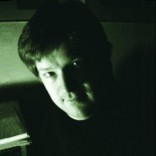The Memory Gardener
Tad Bartlett
At first Ruth saw the man only at night, skulking through the shadows at the back of her and her neighbors’ exurban Atlanta yards, and if she would remember him in the daylight she would wonder if he were real or a dream.
Since the car accident, remembering things in the daylight was no guarantee. Some mornings, she would stare into the refrigerator to figure out the things she got out to construct breakfasts. She would sit at the counter and stare at her children while they ate. They seemed always taller than she thought they should be, and she would speak small morning talk to them while she worked her brain to put names to them. She might tentatively speak a name to make sure it was right.
“George, you slept well?” she might say to the tallest one, the one who looked like his father. And if “George” was the right name for the child, and she was always almost sure it was, then “George” would be the name for the children’s father, too. Ruth might not remember their names right away, but always she remembered the old details, the births, the naming, the arguments, the regrets, the leaving. And yes, the tallest son was “George,” and then the rest clicked into place, that he was fourteen and a freshman in high school where he got good grades and hung out with pleasant children.
And Rebecca was the middle one, eleven and dark and troubled but so good and sweet in her heart. And then there was Joey, nine, funny, who didn’t even remember their father, the gone George.
Ruth wondered if the kids ever saw the man she would see in the shadows, but they never mentioned it if they did. There was a time when she wondered if he was the kids’ father, but she’d dismissed that as a possibility when she noted that he never stopped at their property, but was always passing through, always looking down at his feet going down one in front of the other, always moving, hunched over, a large sack slung over his shoulder, a snap-brimmed cap pulled low over his eyes. Ruth couldn’t make out much else. A father would have stopped and peered through the low branches, hungry for a glimpse of his children.
Ruth was 48. She checked her driver’s license each morning, and compared it against the calendar hanging on the side of the refrigerator, to verify and remember, to put it all together again.
One afternoon in the late spring, stretching into daylight-saved evening, supper dishes cleared into the sink, Ruth sat on her back porch watching the sun sink into the tangle of trees at the back of the property. They were thick enough that she couldn’t see to the houses the next street over. The late light in the high leaves reminded her of being a little girl living out in the country, red clay Alabama with dusty bare feet on wide wood porch planks. Ruth slipped her feet out of her sneakers and spread them on the cooling concrete of the grown-up porch of her grown-up house in her grown-up neighborhood. The boys were inside, studying or watching TV or plugged into their music. The girl, Rebecca, sat in the grass in the yard, her back to Ruth, her face down close to the turning pages of a book.
Movement in the shadows under the trees distracted Ruth. The man was there, making his way through the deepest part of the shadows. Ruth had never seen him this early in the evening. He stopped. He might have glanced at Ruth, but she couldn’t be sure. Quickly, he dropped the sack from his back and stooped down on one knee. He looked like he was digging around in the leaves. Then just as quickly he was up again, hefted the sack, and continued his walk.
He was gone before Ruth could think to get up, to say something.
“Rebecca,” she said, “did you see that man?”
Rebecca looked back at Ruth, peering out from beneath black bangs that all but covered her eyes, almost a scowl on her face. She sighed, then asked, “What man?” and Ruth thought she heard the unspoken exasperated thought, the “What, this time, is wrong with Mom?”
“Nobody, sweetie. It was nothing. Shadows.”
That night, after the kids had been up in their rooms for an hour, Ruth turned off the television and all the lights downstairs and went and stared out the back door at the trees. The moon was out, the yard illuminated and empty. The trees were silhouetted against a purple black sky. She stepped across the porch onto the grass. The blades were soft and damp under her feet. Nighttime mist hung from the trees like a gauzy curtain that puddled onto the grass and billowed toward her.
The night reminded her of something she couldn’t name.
She walked slowly across the yard, one step in front of another, pausing, stepping again, expecting at any moment to see the man walking stealthily through the trees, but not seeing him so walking closer still, until she was in a moon-shadow dark under the trees. Somewhere near where she stood was where the man had dug around on his pause in his walk earlier in the evening.
Ruth knelt and ran her hands through the leaves, her fingertips brushing over the dirt. She felt nothing out of place. She brought her fingers up to her nose and smelled them. They smelled like fireflies and honeysuckle and long-dead things in past summertimes when she was a teenager sneaking out of the girls’ cabin at camp to meet with Jeremy to drink and kiss and never finding him and instead wandering through the woods almost in a trance all night, lost under stars and in her thoughts.
Ruth felt the ground again, widening the circles of her outstretched hands, crouching forward, her fingers bumping over roots and sticks until her right hand felt a mound of soft broken dirt beneath the leaves, something disturbed and buried. She took both hands and swept away the leaves and the loose dirt and felt something firm and lumpy and cold. She pried it from the ground and stood and stepped out from under the trees into the moonlight and held it up.
It was the size of a small peach, but it was gray. While it was firm, it had some give. Its surface was canyoned with small convolutions and folds on one side, but was cut away sharp and flat on the other sides, roughly cut from something bigger. It seemed to glow from the inside, like luminescent algae in a dark Florida tidal lagoon.
“Excuse me, ma’am,” a man’s voice said, gruffly, a voice not accustomed to being used.
Ruth looked into the trees, and he was there. His hat brim was pulled low, and the shadowed face was fully covered in a beard. He had the sack slung over his shoulder, but with one hand reached out toward Ruth, toward the thing she held in her hand.
“Excuse me,” he said again, and took a tentative step forward.
Ruth dropped the object at his feet, and turned and ran back into the house.
~
The ringing in Ruth’s ears woke her the next morning before the sun rose. Intense, constant but varying in pitch. Loud. She sat up in bed, gripping both sides of her head. The pain would follow soon.
She rushed downstairs into the kitchen. She pulled cereal bowls down from a cabinet and set the box of cereal out on the counter, then collapsed on the sofa as the pain began, like one drill boring down through the top of her skull and another drill boring laterally across her head, entering behind her right ear and coming out behind her left ear, the two drills intersecting deep in her brain and sending radiating shrapnel ricochets throughout her head.
And the whole time, the ringing. And in these times she remembered everything, all at once, Christmas morning at Maw-Maw’s and Paw Paw’s fishing camp, all three children’s births, every moment of them, the crowning, the screaming, the full heart, the first time she kissed a boy, all the disappointment, the night George her husband fucked their neighbor on the back porch, a jar full of fireflies, a black-charred leg of lamb when she was thirteen, Easter and the house filled with smoke, the man burying things in the backyard, dark fruits, driving fast and angry around Stone Mountain at night, her college graduation, her parents, both still alive then, sweating and smiling, no one drunk, the afternoon by the pool when she was eighteen holding Moira’s hand while Moira cried, skies pocked with stars, the murk-filled club in Mobile where she met George the first time, the headlights growing bright around the curve, the first wreck.
“Mom,” Joey said. “Mom, wake up. It’s almost ten-thirty.”
Ruth opened her eyes. The ringing was gone. The house was still. Her head was sore, like her legs after a half-marathon, but the drilling pain had stopped, the shrapnel gone. Joey kneeled on the floor by the sofa, looking at her, a smile ready to break out, but his eyes tender and concerned.
“Are we still going to the beach?” he asked.
“Of course,” Ruth said. The beach. The kids’ spring break. Of course. “Did y’all eat breakfast?”
“A couple hours ago, Mom, yes, and everything’s cleaned up. Are you OK?”
Ruth sat up. “I will be.”
Joey looked into Ruth’s eyes, like he was trying to see in through them, see inside her head, check it out for trouble. After a couple seconds, he stood, let the smile out. “Then let’s go. We’re all packed!” He ran to the bottom of the stairs and yelled for George and Rebecca to bring their bags down, that Mom was up, time to go.
As they backed down the long driveway, Ruth thought she saw him, the man, just a rustle of leaves in the trees behind the house.
~
Just before sunset, Ruth pulled the car into the parking lot at the state park campground in the dunes. In the long light of dusk, George helped her pitch two tents and set up a table and chairs and camp stove in a clear area in between them. Joey and Rebecca had gone to look for sea shells.
“We could build a little fire, Mom,” George said.
“It’s too windy out here. If we ever got it going, I’d be afraid where it might jump.” Ruth wanted a fire, too, like so many camping trips with her parents after her dad came home from his last tour in Vietnam. Bug spray, marshmallows, and snakes. But out here, it was sand and wind and salt. In warmer months, there were relentless black flies at night, but not in chilly spring.
Ruth made grilled cheese sandwiches in a frying pan on the camp stove, and served them with piles of ketchup. The kids ate them quickly. Then all four of them brought their tin camp plates, the frying pan, and the spatula to the edge of the surf, scrubbed them with wet sand and rinsed them in the waves, then laid them on a log of driftwood at the high tide line. Stars spread above, layers upon layers of pointed lights, sweeps of galaxies.
“Let’s run,” Ruth said, and no one, not even Rebecca, rolled their eyes, or questioned her. Instead, they all started running at full speed down the strand, not a race, no finish line, but speed with no object, wind pulling their hair, their arms out, their legs carrying them like wings, their feet sometimes pounding the firm sand just beyond the water, sometimes splashing through foam, and they whooped and they laughed, and Ruth was fourteen like George, and eleven like Rebecca, and nine like Joey, and forty like she was when older George left, and twenty-two like when they met, and forty-three like she was when she had the last accident, and forty-five like she was when the doctor told her she’d never get better, and seven like she was, like she was. And then they were tripping and stumbling and tumbling together in a ball of family and sand; and they were walking back to where they left the dishes on the driftwood, a straggled line down the beach, full, quiet.
They lay on the sand, their heads against the driftwood log, staring up at the night sky.
“How’s your head, Mom?” George asked, calmly.
They rarely asked. “Out here, it’s like it all never happened,” she said.
Rebecca grabbed Ruth’s hand from the other side, squeezed.
“It’s beach magic,” Joey said.
“You can’t believe in magic, Joey,” Rebecca said, without letting go of Ruth’s hand.
“I know,” Joey said. “I mean that it’s just like the air or something.”
“It’s good medicine,” Ruth said, “whatever it is.”
The next morning, after they ate breakfast, the kids built sand castles and gradually got more and more into the cold water, first just filling up buckets, waves splashing them up to their shins, then their knees, on accident, but then on purpose, and then to the waist, and then they were throwing themselves into onrushing waves, swimming them back to the beach and going back out again, T-shirts and shorts drenched.
Ruth watched them from on top of a dune, between pages of a book she might have read before, but couldn’t be sure. Fog creeped between her smiles, blurred the lines. A few times she felt someone watching her, but when she would turn slowly and scan the dunes all around, no one was there. From the top of her dune, she could see their two tents, and she could see the parking lot of the campground. No other cars were there but hers.
That night, after supper, while her children laughed and talked about friends back home, or remembered past holidays and vacations, and told jokes on each other, and ghost stories, Ruth listened, knowing there was a map in what they spoke, a way back, hoping. But before she could grasp onto a hint of a trail, they were yawning, then “good night, Mom,” and crawling into the tents and their sleeping bags.
“Good night, kids,” she said, but she felt somewhere else.
She walked back up into the dunes that separated their tents from the beach. Instead of walking down onto the beach, she stayed in the dunes, parallel to the surf, walking up one and down the next, thin stalks of sea oats lashing her legs. She came to a valley between two large dunes that rose up around her, and she could have been anyone, at any time, ageless, with any history.
Ruth looked up into another clear night sky of stars, but instead of feeling awe or comfort, she felt only panic, wondering when she was, where she was. She knew there was a definite answer, and that the answer should not carry bad news, but she felt a gnawing sense of dread in her chest, nonetheless, against the back of her sternum, like a rat. She remembered, isolated, unattached to any other memory, a white lab rat. She couldn’t remember its name, but remembered it had a name, and that she had named it. She remembered thinking it had a loneliness in its eyes, behind the thin metal bars of its cage, a desperation.
Escaping the dune valley, she walked down onto the beach, a beach, not quite certain which beach. She walked into the waves, until they splashed against her knees, and she stared out into the dark waters. Another memory through her mind, of her and her father out in large swells floating on inflatable pool rafts, when she was eighteen, the summer before she left for college, the water too deep for standing, their arms stretched out toward each other, his thick, strong fingers interlaced with her longer, thinner ones, and the dark quick whorl of something swimming up close to them, then turning, a break of a fin above the surface, then gone, and Ruth wishing she could tell her father about the girl she had loved that summer, and looking at him tentatively across the small space between their rafts, and not being able to read his eyes, whether there was tenderness there, or sadness, or strength, and not knowing if she would disappoint him, and just when she’d resolved to say something, the small catamaran cutting through the wave-tops toward them, two boys hanging over the edge, laughing, yelling, out of control, and Ruth had parted hands with her dad, and they had dived beneath the water in opposite directions, and Ruth wished she could remember more of that, that afternoon, that evening. She wished she could remember if her father had ever known, and then she wondered if she’d ever known him. The night pressed the remembering shut.
Ruth turned and walked back up onto the beach, the salt water clinging to her, heavy weight. She walked along the beach until she came to a driftwood log that seemed familiar. She sat down on it, and she tried to remember why she knew this log. But the more she tried to turn her mind to it, the more it resisted her, returning only blanks. Her mind and her memory were magnets of like polarity, repelling each other all the more, the harder she tried to match them up.
She grew tired, and slid down off the log to lie on the sand, resting her head on the log.
That’s when she sensed he was here, walking the dunes behind her, planting his little packages, reaching into his sack for another one, stooping down and pushing it below the surface of the sand, one after another, not watching her, but knowing she was there. Maybe he was planting a garden for her, but of what flowers, what fruits, she couldn’t know. Or maybe he was the harvester, taking whatever bounty away from her.
~
“Mom, Mom,” and Ruth felt a hand shaking her shoulder.
She looked up. The sun shined bright down onto her face over the shoulder of a tall, beautiful girl, dark hair falling into her eyes, her daughter. She thought for a moment, but couldn’t come up with it.
“Mom,” the girl said again. “It’s me, Rebecca.”
Right.
“You never came into the tent last night,” Rebecca said.
Ruth sat up. She looked down at her hands. Her hands. Hands of someone older than she felt, than she knew, ropey veins like her own mother’s used to be. “I’m sorry, babe,” Ruth said, looking back up at her daughter. “I just came out to listen to the waves. They were so relaxing . . .”
Rebecca cut her off. “I know, Mom. Don’t worry about it. Look, George and I think maybe we should go home a day early. Like today.”
“If that’s what you think,” Ruth said, standing, unsure.
“We need to, Mom. We’ve had fun, really. But,” and her daughter paused, and Ruth suddenly hated herself for the life she was giving her children, wished she could be like their friends’ mothers, “but you’re tired. We see that, and it’s OK. Let’s go home.”
As the two of them walked up the dune, Ruth saw indentations in the sand, like large bootprints blown indistinct by the wind, and little holes. They could have been sand crab hidey-holes, ghost crabs her father called them, but what if they were something more sinister? Part of her wanted to argue with Rebecca to stay here, that she was fine, but it was easier and safer to just follow her across the dune-top and down into the campground, to break down and fold up the tents.
She kept catching the kids each watching her, then looking away. As she stuffed the last sleeping bag into the back of the car, she offered up, “Stop it, all of you. I’m fine. It’s fine.” She’d meant it to be tender, but it came out angry, and so she didn’t try to follow up on it, for fear of making it worse.
The sun beat harsh through the windshield on the drive home, through Ruth’s sunglasses, into her head. She snapped the radio power to off. Later she turned it back on, irritated by the silence, then turned it up, then back down, barely audible, a blur of white noise.
Once home, the car unloaded, the kids retreated to their rooms, their headphones, occasionally appearing in the flicker of light from the refrigerator as they pulled out cold cuts to make sandwiches and disappear again, wavering spirits. Ruth sat in the den, cocooned in a large chair, the lights off, the screen on her laptop as dim as she could make it and still see what flashed across it. She did this sometimes, tried to search the world’s collective electronic memory to jog something of her own.
This particular rabbit trail started with a post about photographs of hands. A procession of black-and-white photos of villagers’ hands held palms upward, hoping to be filled with medicine from the visiting Army doctor; hands planting sprigs of rice seedlings into a watery field; hands caressing the trigger of a beat-up AR-15; hands buttoning the large drab buttons of a drab shirt; hands with fingers through the loop of the pin of a grenade, ready to pull; polish on a woman’s manicured nails; a hand severed and bloated and blackened on the floor of a hut. That page of photos linked to more by the same photographer. Helicopters hovering over a field full of corpses and guns; a family of Montagnards, jungle foliage behind them, impassive looks on their faces while they listen to a young kid, close-cropped hair, Army fatigues, crouched in front of them; two soldiers in a trench outside Hue, marijuana smoke billowing out of a gun barrel held by one; an aerial shot of a bridge over a meandering river, bomb blasts to either side; children running down a street toward the photographer, horror on their faces, buildings blurred in the background aflame.
Image followed on image in front of Ruth’s eyes, things that could not be her own memories, though she felt them like they were. Maybe they were her father’s memories, the things he never talked about once home, the darkness behind his eyes, and she thought maybe she could feel the memories of her parents like they were her own, and maybe her children could feel hers, and this thought, perhaps more than the pictures, was why she felt tears on her cheeks. She closed the laptop and set it on the floor. She sank further into the chair in the complete dark of the house.
When she’d slowed her breathing, and she felt like she could stand without the world tipping on its side or the pain knocking her back, she left the chair and walked out into the backyard. Clouds covered the moon and stars, but a light shone in the trees.
She walked toward the roving light in the brush, quickly but soundlessly, without fear. The man was there, his sack resting on the ground, and he was crouched down in the leaves and the dirt.
“What are you doing?” Ruth asked.
Without turning or looking up, the man said, “I’m planting.”
“What?”
The man did look up at this. His eyes were small and shining in his hairy face. “If you don’t mind,” he said, “but I’m already late to get these in the ground.” He looked up to the sky, through the leaves of the trees. “These clouds are moving quick, and the moon will soon be out again.” He turned back to his task, his hands moving fast in the leaves, his fingers scrabbling at the dirt.
Ruth walked closer, and saw spread out before the man on an unfurled scrap of cloth more of the peach-sized lumps of glowing matter like she’d seen a few nights before.
“Well take one if you want it,” the man said. “Pick it up. Smell it. You were so curious the other night. I don’t know why you left it.”
Ruth bent down and picked it up. She caught a whiff of the man. She’d thought he would smell like urine and mildew and body odor, but instead he smelled like a washed dog and a new car, like a day when she was fourteen and it was fall and it was a Saturday and she was in the front yard when her parents came home in a shining Buick and they all drove to Birmingham that evening to shop at the new mall, its soaring atrium glass roof bringing the night in and making everything feel glamorous and hopeful.
She hefted the chunk in her hand. It was firm like a mushroom, but denser, heavier, and it gave off the smell she’d thought was his, even stronger, when she held it beneath her nose. As she took it in, she felt even more present in that long ago night with her parents. She could feel the fabric of the sweaters as she walked past them in the stores, letting her fingers run over each one, smell the wool and the dye.
“What is this?” she asked the man, again.
“It’s the fruit,” he said, without looking up. “You plant the fruit, and maybe more will grow.”
Ruth kept the fruit held under her nose, smelling deeply of it. “Do they all smell like this one?” she asked.
The man looked up. Through the shadows and the beard, Ruth thought he looked exasperated. “They’re each different. Plant them all. Some grow, some don’t. Stay buried is all. But you got to do something with them. Can’t leave them out or they’ll rot in the moonlight.”
Ruth was overcome by the desire to taste the fruit. She opened her mouth, but as her teeth began to sink through its outer layers, she was hit by shooting pain in her head. She dropped the fruit and staggered backward.
“Lady,” the man said, jumping to his feet. “Ruth.” He caught hold of her, one hand around her back and another grabbing her arm to steady her. “You shouldn’t be out here,” he said.
He half-carried, half-walked her up onto the porch and lowered her into a chair.
Ruth looked up at him, silent. The clouds blew ragged in the sky, uncovering the moon. The light shone down on the man, and Ruth saw him clearly for the first time. He was so familiar, though she couldn’t place him. He wore a long brown overcoat. Tweed pants poked out from under the hem, the cuffs pulled out and dragging, almost covering sturdy black boots. But his face was still too obscured by his beard and by the shadow of his cap.
“I know you,” she said.
“Of course you do. Now I best be gone, ma’am.” And he turned and walked back into the trees. He picked up his sack and walked off into the shadows.
The pain cleared from Ruth’s head. She stood and went inside.
That night, she slept dreamless.
In the morning, she awoke to pure white sunlight coming through the windows. She went downstairs and cooked bacon and a pan of scrambled eggs studded with melted cheese. When George and Rebecca and Joey came downstairs, she knew them and remembered them. She fixed them plates, and they sat on stools around the counter, planning the rest of the week of the kids’ spring break. There was talk of the zoo, and a hike up around Amicalola Falls.
After they cleared the plates, the boys went upstairs to get dressed. Rebecca stayed in the kitchen with Ruth while she began to rinse the dishes.
“Was that man in the yard again last night, Mom?” she asked. “The one you asked about before?”
Ruth kept looking intently at the soapy frying pan she was scrubbing. “You saw him?” She asked it carefully, evenly.
“Maybe I’ve seen him before,” Rebecca said. “But maybe not.”
Ruth looked up from the pan. “Yes. It’s hard to know. Sometimes we want to see him.”
“I wish he were Dad,” Rebecca said.
“You know he’s not, right?”
“I know, but I wished.”
“I wished he were my dad, too,” Ruth said. She smiled at her daughter and took the pan from her. “It’s OK. Go up and get dressed. I’ll finish up down here.”
When Rebecca was gone upstairs, Ruth looked out the kitchen window, over the backyard, to the trees. As a slight ringing began to pierce her head, she thought she saw green shoots coming up from the shadowed ground, thought she smelled faint blossoms.



















